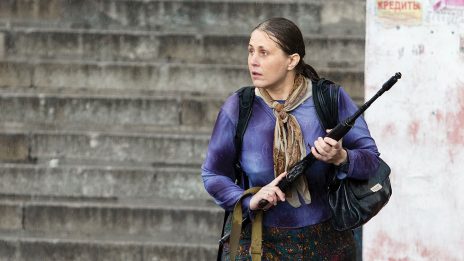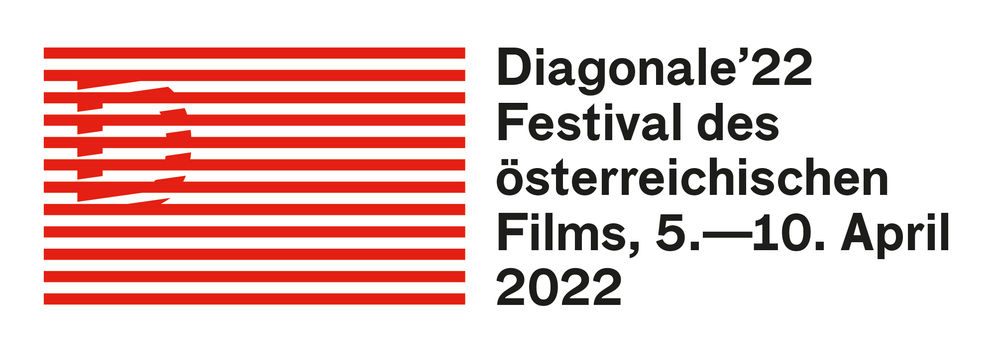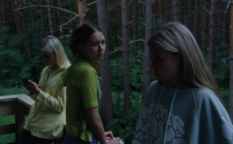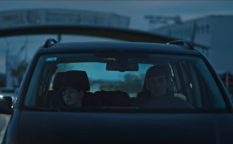Review: Signs of War (2022)

The war in Ukraine did not start on February 24, 2022, but eight years earlier. The conflict in Donbas region in the east of Ukraine has been with us since 2014, and before that, there was the secession of Crimea and its annexation by Russia. The origins of the conflict could be traced even further back, to Maidan events of late 2013 / early 2014, to the Orange Revolution following the elections in 2004, and even to the dissolution of the Soviet Union. The warning signs were there for us to see.
In regard of the current situation of the full-blown Russian aggression on Ukraine, the documentary film Signs of War, directed by Juri Rechinsky and Pierre Crom, provides a detailed context and pretext to the events we are witnessing right now, at least when it comes to the last 8 years. The film world-premiered at Diagonale (in the documentary competition), and, judging by its theme and approach, will likely travel the festivals specialized in documentaries and political cinema.
Signs of War is based on Crom’s photo- and video-material he obtained as the conflict photographer reporting from Ukraine. Before that, this French man based in The Netherlands, made a career as a photo-journalist covering the country’s inner political life. Juri Rechinsky, known for his documentary Sickfuckpeople (2013) and fiction film Ugly (2017) came on board as an editor at first before taking creative control as a writer and co-director, while maintaining his initial function as the film’s editor. The reason for such move is that Crom’s original material consisting of high-quality war photos and low-quality videos quickly filmed on a photo camera was not enough to make up for a movie on its own.

The film is divided in several chapters, each centred around the key events like the shady referendum in Crimea and the “unification” celebration, the referendums in Doneck and Luhansk regions and the breakout of the war in Donbas, the fall of the Malaysian passenger plane shot down by the Donbas separatists and so on. One layer of it is the photographic material displayed on the screen, with Crom serving as the voice-over narrator, remembering the events he witnessed, the tricks of the trade of a war photographer, and his general feelings at particular moments. The moments of silence are filled with Anton Baibakov’s exquisite musical score, while Peter Utvary’s sound design illustrates the context further. The other would be the classical “talking head” interview in which Crom assumes the role of the interviewee talking to the cameras. Rechinsky welds the whole thing masterfully and with an accent of clarity and followability, up until the first of the film’s epilogues, set in 2019. However, the second epilogue, containing the footage from the current war, feels “glued” in an artificial fashion to the rest of the material.
The film is at its best when Crom and Rechinsky focus on the seemingly small bizarre moments of war that nevertheless leave grave consequences (such as the fact that Crom was allowed to extensively photograph the Russian artillery in action because the administrative officer was in love with the (female) squad commander), or when they point out to the ideological confusion and the illogical mélange of symbols used by both sides in conflict. However, Crom’s distinctively Western, journalistic and, in the lack of better word, objective perspective might be seen as controversial in the wake of the recent events that urge the viewers to take side. Eventually, Signs of War works better as a summary of events and historical streams leading to the conflict, while only occasionally serving as a proper eye-opener.
Runtime: 88’
Countries: Austria, Ukraine, The Nethlerlands
Languages: English, French, Russian, Ukrainian
Directed by: Juri Rechinsky, Pierre Crom
Written by: Juri Rechinsky
Cinematography by: Serhiy Stefan Stetsenko, Pierre Crom
Editing by: Juri Rechinsky
Music by: Anton Baibakov
Sound design by: Peter Utvary
Sound recording by: Bohdan Barakovskykh
Colourist: Raimund Sievetz
Assistant director: Yana Suska
Produced by: Barbara Caspar, Martin Maier, Juri Rechinsky, Pierre Crom
Production companies: Fragile Features, Martin Maier Media
















